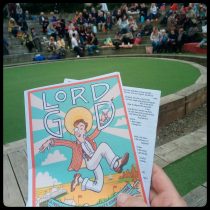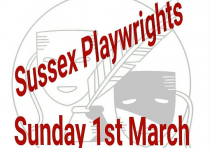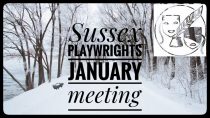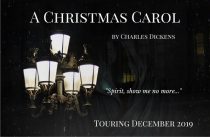Sussex Playwrights Reviews: Julius Caesar
Brighton Shakespeare Company
Brighton Open Air Theatre
A unique experience – reviewing two different performances over two nights as the elements put in a spectacular first night appearance in Brighton Shakespeare Company’s tense, intense and cool new production of Julius Caesar at the Brighton Open Air Theatre.
Dreadful portents and bad omens set the dark mood of the play, and on the first night, that uneasy threatening sense spilled out into the real world. Crows flapping about over the darkening space, distant sirens in the city and a lowering sky, sullen thunder, flashes of lightning – the theatricality was spectacular and we were riveted. Called off at the interval with ‘cry havoc and let slip the dogs of war!’ – well, we had to come back for more.
Shakespeare’s tale of unrest, mistrust, angry mobs, betrayals and conspiracies feels uneasily real right now, and is presented in BSC’s signature pared down style, this time inspired by a Tarantino aesthetic.
The mood’s sombre, a simple black and white pallette, dark suits, shades and little black dresses, with washes of red light for the conspiratorial exchanges on the bare green stage.
Taught, punchy direction by Mark Brailsford with Sarah Mann and Kerren Garner, and some stylish unpleasantness from the fight arranging team Jack Kristiansen and Josh Plummer mean the show zips along with energy and pace.
Julian Parkin’s Caesar is a restrained and distant being, a god of human frailties.
As the conspirators, Sean McLevy’s blazing Cassius, Deborah Kearne’s slyly amused and knowing Casca and Stewart Barham’s infinite sadness over what he must do light up their shifting, fatally intertwined relationships.
Andrew Crouch as a youthful, commanding Mark Anthony delivers a magnificent performance, huge-voiced and passionate.
Kerren Garner’s Portia and Tia Dunn’s Calpurnia show another side of the politics of powerful men; the wives who must bear the spotlight and share their husbands on a huge stage. Demanding then begging for attention, notice and consideration, these are too-brief glimpses of two formidable women.
Great support from a multi-roling team, George Derbyshire, Mark Brailsford, Jules Craig, AW King, Katy Matthews and Oscar Smart, and a sweet and ultimately heartrending turn by Phoebe Elliot as the boy Lucius.
The play continues through Sunday at BOAT.
Details at http://www.brightonshakespearecompany.co.uk/
Philippa Hammond
Sussex Playwrights Reviews: The Ghost In The Machine (The Seance)
A Sussex Playwrights first – we review John Knowles’ new online play created entirely in lockdown
Sussex Playwrights Reviews:
The Ghost In The Machine (The Seance)
A Zoom play by John Knowles
Cast:
Amelia – Emily Carding (editor)
Alice – Sabina Arthur
Frank Sidney Kean
Pete – Patrick Kealey
Gary – John Knowles
The Ghost – Dominique Gerrard (director)
Gary’s Wife Susan Elliott
May’s an amazing time for creativity, here in Brighton and Sussex.
At the time of writing, Brighton Festival, Fringe and Artists’ Open Houses should be happening all over the city.
But as we all know, it’s all off for now.
Instead, an extraordinary flowering of creativity is happening online. Artists are creating new audio, TV, film, music and different ways of communicating all using the internet. We’re seeing ambitious live Shakespeare performances in isolation, new audio dramas and commercials all filmed in the actors’ own homes.
And here’s a first for Sussex Playwrights Reviews – a brand new play by John Knowles, filmed and delivered entirely online, a collage of actors’ faces and backgrounds all recording into their own devices in isolation.
An online seance is about to begin. The familiar group is gathering together in isolation for the first time, led by medium Amelia (Emily Carding), all smoky eyed and ethereal in the Northern lights – until of course it all begins to go wrong. She’s dragged out of her carefully cultivated persona, as slightly pissed Gary (author John Knowles) crashes into the meeting.
The play has great fun with the social and technological awkwardness we all share in the New Normal; as you can’t hold hands, just how do you cope with that online? Those interruptions from family, arguments and unfortunate revelations when mute hasn’t worked – they’re all so now.
Amelia’s valiantly holding together the wafty ‘is there anybody there’ schtick, but finally losing it in the face of intransigent irritating people is very funny.
But the note turns dark when another participant logs in and gains control of the meeting.
Knowles’ writing ranges from amusing parody, closely observed online chat and exasperated rows, to the final editorial tone of the play’s real message.
The fun, relatable premise leads us into explorations of online spying, Zoom bombing, and just how much information, personal details and secrets about ourselves do our computers contain – and who has access to it?
It’s real lockdown theatre for now.
March 2020 meeting report
March 2020 report
Actor/writer members performed extracts from their own solo plays, followed by conversation with Philippa and the group about their writing and performance practice.
Janet Behan’s ‘Why Shouldn’t I Go?’ tells the stories of three very different Irishwomen who share one thing in common, religion and the impact it has had on their lives.
Robert Cohen’s ‘Something Rotten’ premiered at the Barnstaple Fringe Theatrefest, and went on to win an Argus Angel award at the 2016 Brighton Fringe.
Simon Jenner, playwright, poet and prolific and tireless reviewer of theatre in London and Sussex, gave an overview of the thirty or so productions he’s seen and reviewed in 2020 alone!
All the best, everyone – please do keep writing, listening, watching and talking everything to do with creating new drama for stage, screen, radio and internet. Hope to see you soon.
Philippa Hammond, chair
Thomas Everchild, secretary
February 2020 meeting report
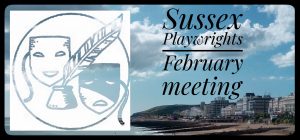
Sussex Playwrights February 2020 meeting
Sussex Playwrights was first formed in 1935 to promote members’ writing.
In the 21st century one of the best ways to spread the word is to get the writer’s voice out there, using the text and sound publishing systems available to us.
Sussex Playwrights: The Podcast
At our February 2020 meeting, we recorded material for our podcast introduction and promotion.
A chance for members to make short announcements about upcoming projects and productions.
In future podcasts we’ll include readings and interviews with writers, actors, directors and producers.
Announcing the 2020-2021 Constance Cox Prize Playwriting Competition
With the rise and rise of Print On Demand publishing, we’re planning to promote writers and writing by publishing the first collection of plays for stage under the Sussex Playwrights brand.
Our next Constance Cox Prize Playwriting Competition will also be a call for entries for this collection.
Details will be published on the website later on.
Enquiries to Thomas Everchild, secretary@sussexplaywrights.co.uk
January 2019 meeting
January report
We kicked off our 2020 with new writing, a glass of wine and great conversation with Sussex Playwrights.
Our guest, actor Heather-Rose Andrews, had just returned from her Christmas in New York where she performed Sam Chittenden’s adaptation of Kafka’s Metamorphosis, to audience and critical acclaim.
Heather was in conversation with Philippa discussing the business of adaptation, re-imagining a classic work for the stage, and performing in an iconic New York venue to great reviews.
And James Alexander Allen presented a reading by Tristan Woolf and Kevin Cherry from his latest script We Can Be Villains for discussion and analysis.
If you’d like to bring a short piece for a scratch reading on a club night, email Philippa Hammond chair@sussexplaywrights.co.uk
A Christmas Carol
Directed by Kerren Garner
Technical support Katy Matthews
Music Tom Dussek
Violin Seth Morgan
